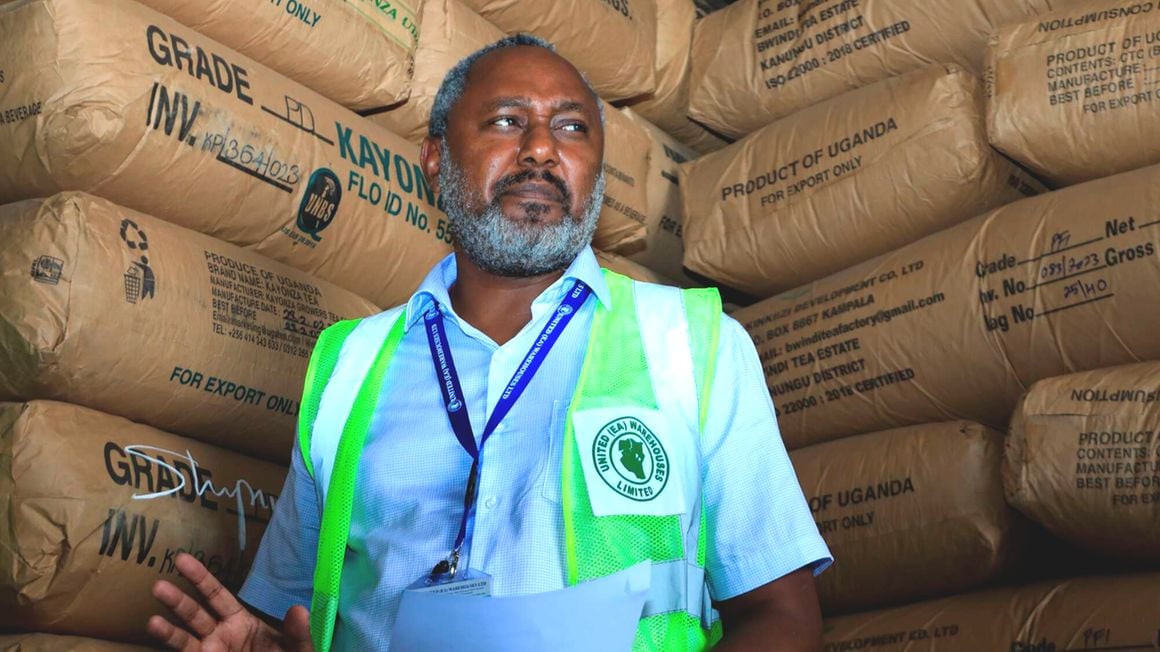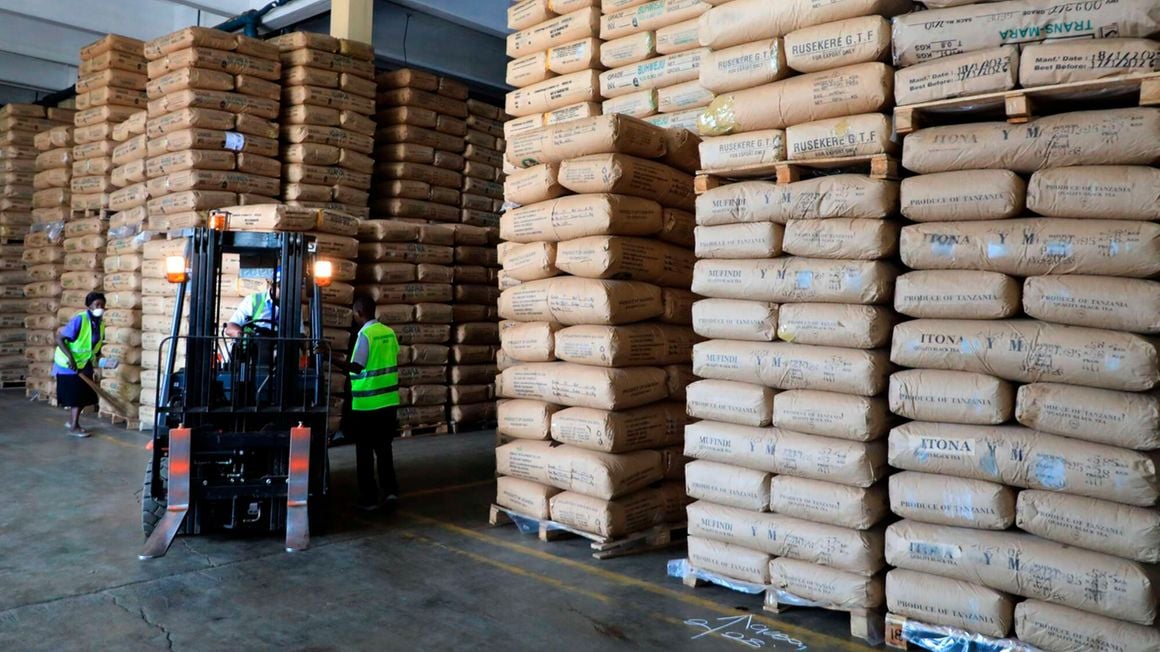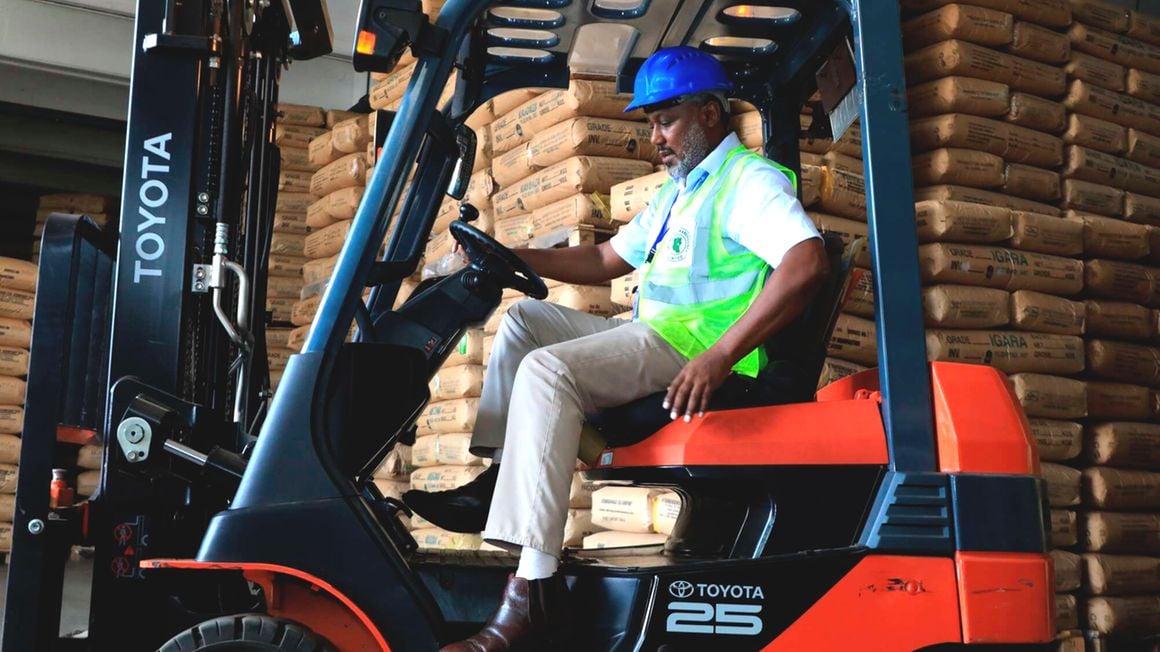
United (EA) Warehouses Limited Managing Director Steven Ogwapit carrying out Operations inside the Tea storage Warehouse in Mombasa in this photo taken on March 29, 2023.
Growth is gradual. And the greatest gambit to attaining gradual growth is employing consistent efforts, putting proper systems in place, recruiting the right people, and reinventing yourself every now and then.
For Steven Ogwapit, one key lesson he has learned over the six years he has been the managing director of United East Africa Warehouses is that running a successful business is like running a marathon.
You build momentum, study your terrain and train your focus on the 42nd kilometre for that is where the finish line is. Then keep running.
“Every business starts with an aim of making profits, you have to remain firm on that race, it is gradual, it involves commitment and sacrifice like a marathon. You have to keep looking back to know what is not working and looking for other ways to make things happen,” he says.
Also read: Sisters find co-working space business success formula
Mr Ogwapit took over running the family business from his father. He has been at the helm of United Warehouses for only a quarter of its existence.
The business started operations at Chimanzi in Mombasa. His father, Joseph Justin Ogwapit saw a gap in the tea exporting market and from it, an idea was born. Mombasa’s tea auction facility, services customers from as far as Burundi, and Madagascar.
“We were registered in 1999 and started operations in March 2000. My father desired to create a space where sellers would access a reasonable storage facility in terms of proximity to the auction venue, minimise their logistical pressures, store their commodities in the best conditions, and remove the burden of security from them,” he says.
Operations inside the United (EA) Warehouses Limited, a Tea Storage Warehouse in Mombasa in this photo taken on March 29, 2023. PHOTO | KEVIN ODIT | NMG
Growth
His father, ‘scraped’ from his savings, borrowed from family and friends to set up their first warehouse. They had five employees then: A driver, a clerk, an accounts assistant, a store manager and Mr Joseph himself.
They were working on roughly 20,000 square feet. Their turnover then averaged about Sh2.6 million.
From the first warehouse, they have grown to 34 taking up some 300,000 square feet of space. Their turnover now stands at about Sh13 million.
They have warehouses in Nairobi, Mombasa, a representative office in Malaba, another in Kampala, and soon they will have one in Goma in the DRC.
When they started, their focus was mainly tea, but they have since diversified to other fast-moving consumer goods.
“We now have commodities like rice, millet, sugar, and cooking oil,” he says, adding that they also store food and other supplies for organisations such as World Food Programme and Catholic Relief.
Running family-owned commercial enterprises is a hurdle most businesses trip on. Family feuds are always the trickles that break the dam.
How have they successfully run one for the last 23 years? They communicate, he says.
They stay aware of the risks that exist when boundaries are not well-marked and avoid them.
“We see always in the news how family businesses fail and ours has been a journey of learning. Our biggest understanding is that even though they should be separated, it is practically impossible to remove family from a business we own together. Therefore, we use this connection and the deep understanding we have of the family to create a conducive working relationship."
Operations inside the United (EA) Warehouses Limited, a Tea Storage Warehouse in Mombasa in this photo taken on March 29, 2023. PHOTO | KEVIN ODIT | NMG
By clearly creating roles for family members especially those in active management, we avoid conflict in running the affairs of the company which is a common enough pitfall that bedevils this nature of enterprises.
The law also comes in handy in matters of shareholding and ownership. Further, we have non-family shareholders that help in bringing unbiased views on matters, especially in the process of decision-making.
We have also allowed ourselves to take roles according to our skillsets, experience and interests,” he says.
Also read: Entrepreneur rides on tie-up to build high turnover digital marketing firm
Succession
On succession, his father passed the baton six years ago through a gentleman’s agreement that involved their board of directors.
However, Mr Ogwapit says that may not be a sustainable way of doing business. Therefore, they have started thinking about it more professionally.
They have onboarded a consultant on corporate structures to help them figure it out.
“We realise that for sustainability and continuity of the business, we need to have a more corporate structure independent of the family. The consultant is taking us through that,” he says.
Mr Ogwapit is a trained and practising architect. His architectural firm is based in Mombasa and he runs it alongside the family business. Are these competing interests?
“People running family businesses should not just have skills to run that business alone. Diversity is the spice of life. There is a lot to learn out here that can be of benefit to the family business. For example, my architectural mind is very creative, joining that with the structure at United Warehouse is important as it allows me to think creatively when I am the managing director here,” he says.
The warehousing family business plans to get into cold storage, handle horticultural products, consolidate cargo and provide logistics services to their existing and new markets as well as explore other opportunities, especially in the Special Economic Zones.
→nduguabisai@gmail.com

No comments:
Post a Comment